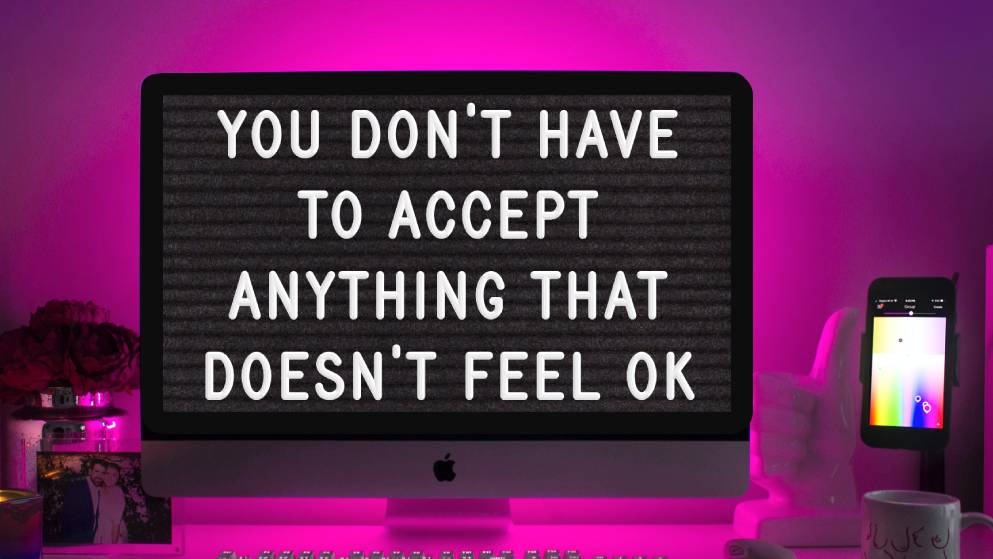Let’s face it, the internet can get very overwhelming sometimes.
As much as the world likes to poke fun at people who work in social media, you really do need a thick skin to be in this business. Putting your (sometimes very personal) brand out for the world to see opens you up to opinions and feedback from everyone with an internet connection, and the feedback’s not always entirely positive.
When you work online, you need to build up a digital resilience. There are hundreds of thousands of ‘keyboard warriors’ and trolls who won’t hesitate to try and drag you or your content to make themselves feel better. That’s alongside engagement rates that could drop at any time, business-changing algorithm modifications being kept in secret gold boxes at Facebook HQ (probably) and hundreds of other people doing the same job as you who you can’t help but compare yourself to. The internet is unforgiving, and it’s important that you’re able to bounce back from the lows.
So what does it take to be digitally resilient? Here are 4 good starting points:
- Build up some self awareness
A huge part of being able to look after yourself is to be aware of yourself. This sounds trite but stick with it; being able to recognise what makes you feel pressured, upset, angry or inadequate will allow you to create your ‘shield’ and protect yourself in the future – so pay attention. When you’re feeling negative emotions about anything you’ve experienced online, step back for a minute and think about what you’re feeling and why. It can really help to write it down; identify what you’re feeling and the specific reason why you’re feeling like that. You might be feeling sad and angry because a troll has left you a spiteful comment on Instagram, for example.
Firstly, remember that someone else’s negativity is not your fault – this goes for trolls, bullies, negative content from other creators and any kind of hate speech or triggering content you might see. People who drag others down online live with the sole purpose of making people feel bad, and they live sad, sad little lives. Having an emotional response to negativity is completely natural and human – we’re not quite robots yet. Bullies want attention, so don’t give them any. Responding to them is validating them and is exactly what they want – you could block or report them instead.
Secondly, it’s a good idea to bookmark your favourite posts with positive feedback that makes you feel great, and bring them out when you’re finding yourself getting worked up over a lame troll. This can also work for content that isn’t yours but that makes you feel good, or even a playlist that’s nothing to do with your online work but that makes you feel sunnier when you listen to it. When you’re surrounded or consumed by negativity, shield yourself with positivity from others.
- Stay connected
This is referring to being connected to people, rather than social media. It’s easy to get lost in digital rabbit holes, and important to remember that you’re not the only one doing a job like this and not the only one to ever feel like this. Voicing your feelings out loud really does help to dissolve them, and sharing your annoyances with someone who does a similar job to you is a great way to realise that you’re not the only one who has this happen to them, and also that you are so much more than your comments and the losers on the internet who try and provoke you.
Laugh at the blatant negativity if you can – laughter makes trolls smaller. You don’t have to go through anything alone.

- Go to sleep
Yeah, this sounds a little odd and isn’t to suggest that as soon as you see some triggering content you should nod-off on the spot, but making sure you get enough rest is so important to being able to be a hard-ass.
If we’re tired, we get upset more easily. When we haven’t had enough quality rest it won’t take long to get annoyed, cranky or sad. Being well rested (and well fed, it’s never a good idea to go online if you’re hangry) is crucial to your resilience. When we sleep, our brain starts to store and organise all the information it received during the day and create memories – a bit like an app update for your head. Less sleep = less organisation and wisdom.
- Be prepared
OK, this sounds a little like a cheesy Girl Scouts motto, but mottos are there for a reason. Before you open your screen and start scrolling, ask yourself if you’re ready for what you might see. The thing about the internet is we have no idea what is waiting for us online, and a scroll-sesh rarely passes without us seeing something upsetting. Have a quick check-in with yourself before you start; how are you feeling right now? Are you ready to potentially see upsetting content? If you do, what will you do? Are you ready to see content from your ‘competitors’ that you’ll instantly start comparing your own content to? How will you talk yourself out of this downward spiral if it happens?
The self awareness that you’ve already established (you’re so wise) means you’re prepared for how you might react or feel if you see something distressing, and that you’ve identified ways to pull yourself out of that feeling and rise above the negativity. Remember what makes you feel better and keep it fresh in your mind; is it a daily look at all your success and positive comments? Calling a friend in the industry to talk to about the annoyances of living online? Reporting a troll and thinking how tragic they are in comparison to your gloriousness? Whatever makes you bounce the negativity off of yourself helps make you stronger and more resilient. Be prepared for whatever weirdness the internet is about to bestow on you today.
What makes you feel better if you see something upsetting online, or experience the pitiful wrath of a troll? Share your tips with the community here, and make sure you read advice from other creators. There’s bound to be something in there that will help you, and being aware, connected, rested and prepared will build up your strength in no time.
It’s a wild world out there, but you got this.
Kate Lucey is the author of ‘Get A Grip, Love’ a funny (ish) look at depression and how to live with it. Order your copy here.







